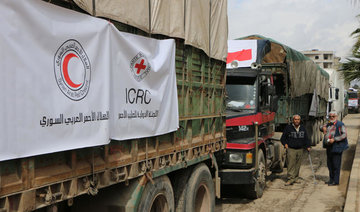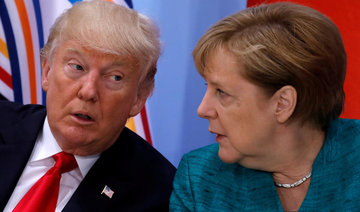GENEVA: Airstrikes on the besieged Syrian enclave of Eastern Ghouta and shelling from the opposition-held zone into Damascus probably constitute war crimes and must be prosecuted, the top UN human rights official said on Friday.
Zeid Ra’ad Al-Hussein, UN High Commissioner for Human Rights, said the perpetrators of such crimes in Syria should know they were being identified and that dossiers were being built with a view to future prosecutions.
In one of the deadliest offensives of Syria’s war, regime airstrikes and bombardment have killed hundreds of people over 12 days in Eastern Ghouta.
The UN Security Council called on Feb. 24 for a 30-day cease-fire in Eastern Ghouta, where 400,000 people live.
“Despite this rare example of unanimity, civilians in Eastern Ghouta have reported that airstrikes and shelling continue,” Al-Hussein told the Geneva rights forum during an urgent debate held at Britain’s request.
“Once again, I must emphasize that what we are seeing, in Eastern Ghouta and elsewhere in Syria, are likely war crimes, and potentially crimes against humanity. Civilians are being pounded into submission or death.” He added: “Syria must be referred to the International Criminal Court (ICC). Attempts to thwart justice, and shield these criminals, are disgraceful.”
Hussam Aala, Syria’s ambassador to the UN in Geneva, said that Al-Hussein was “selective and biased” and that the debate was “politicized.”
British Ambassador Julian Braithwaite said that Eastern Ghouta had become “the epicenter” of suffering in Syria, with starving families huddled in basements to hide from “indiscriminate regime bombing.”
Britain has presented a resolution, which it hoped the council would adopt, calling on UN war crimes investigators to carry out an inquiry into events in Ghouta and report back by June.
“The Assad regime and its Russian backers continue to carry out airstrikes. Airstrikes which have caused more deaths of innocent men, women, and children, and which have caused more destruction of civilian infrastructure — including a maternity ward,” US Charge d’Affaires Theodore Allegra told the meeting.
Also on Friday, the US, Germany and France upped the pressure on Damascus as last weekend’s UN Security Council vote for a cease-fire has failed to stop fighting.
US President Donald Trump and German Chancellor Angela Merkel agreed in a phone call that the Syrian regime must be held accountable. “This applies both to the Assad regime’s deployment of chemical weapons and for its attacks against civilians and the blockade of humanitarian support,” a German chancellery statement said.
French President Emmanuel Macron and Trump called for the immediate implementation of a 30-day cease-fire in Syria.
The French presidency’s office said in a statement the heads of state discussed the situation in a phone call on Friday.
Macron and Trump agreed to “work together” for the implementation of the UN Security Council resolution passed last weekend to allow a cease-fire, the transport of humanitarian aid and the evacuation of the injured and sick.
They call on Russia to “put maximal pressure on Damascus’ without ambiguity” so that the regime commits to respecting the UN resolution.
Macron said the use of lethal chemical weapons, if proven, would lead to a strong response. He said he’s extremely vigilant on the issue, the statement said.
War crimes being committed in Syria's Ghouta must be prosecuted: UN
War crimes being committed in Syria's Ghouta must be prosecuted: UN

Iran foreign ministry affirms support for Syria’s sovereignty

- Assad fled Syria earlier this month as rebel forces led by the Sunni Islamist group Hayat Tahrir Al-Sham (HTS) entered the capital Damascus
Tehran: Iran affirmed its support for Syria’s sovereignty on Monday, and said the country should not become “a haven for terrorism” after the fall of president Bashar Assad, a longtime Tehran ally.
“Our principled position on Syria is very clear: preserving the sovereignty and integrity of Syria and for the people of Syria to decide on its future without destructive foreign interference,” foreign ministry spokesman Esmaeil Baqaei said in a weekly press briefing.
He added that the country should not “become a haven for terrorism,” saying such an outcome would have “repercussions” for countries in the region.
Assad fled Syria earlier this month as rebel forces led by the Sunni Islamist group Hayat Tahrir Al-Sham (HTS) entered the capital Damascus after a lightning offensive.
The takeover by HTS — proscribed as a terrorist organization by many governments including the United States — has sparked concern, though the group has in recent years sought to moderate its image.
Headed by Ahmed Al-Sharaa, Syria’s new leader and an ardent opponent of Iran, the group has spoken out against the Islamic republic’s influence in Syria under Assad.
Tehran helped prop up Assad during Syria’s long civil war, providing him with military advisers.
During Monday’s press briefing, Baqaei said Iran had “no direct contact” with Syria’s new rulers.
Sharaa has received a host of foreign delegations since coming to power.
He met on Sunday with Turkish foreign minister Hakan Fidan, and on Monday with Jordan’s top diplomat Ayman Safadi.
On Friday, the United States’ top diplomat for the Middle East Barbara Leaf held a meeting with Sharaa, later saying she expected Syria would completely end any role for Iran in its affairs.
A handful of European delegations have also visited in recent days.
Regional powerhouse Saudi Arabia, which has long supported Syria’s opposition, is expected to send a delegation soon, according to Syria’s ambassador in Riyadh.
Iran says ‘no direct contact’ with Syria rulers

- Foreign ministry spokesman: ‘We have no direct contact with the ruling authority in Syria’
TEHRAN: Iran said Monday it had “no direct contact” with Syria’s new rulers after the fall of president Bashar Assad, a longtime Tehran ally.
“We have no direct contact with the ruling authority in Syria,” foreign ministry spokesman Esmaeil Baqaei said at a weekly press briefing.
Jordan foreign minister holds talks with Syria’s new leader

- It was the first visit by a senior Jordanian official since Bashar Assad’s fall
AMMAN: Jordanian Foreign Minister Ayman Safadi met with Syria’s new leader Ahmed Al-Sharaa in Damascus on Monday, Amman said, the latest high-profile visit since Bashar Assad’s ouster.
Images distributed by the Jordanian foreign ministry showed Safadi and Sharaa shaking hands, without offering further details about their meeting.
A foreign ministry statement earlier said that Safadi would meet with the new Syrian leader as well as with “several Syrian officials.”
It was the first visit by a senior Jordanian official since Assad’s fall.
Jordan, which borders Syria to the south, hosted a summit earlier this month where top Arab, Turkish, EU and US diplomats called for an inclusive and peaceful transition after years of civil war.
Sharaa, whose Islamist group Hayat Tahrir Al-Sham (HTS) spearheaded the offensive that toppled Assad on December 8, has welcomed senior officials from a host of countries in the Middle East and beyond in recent days.
Jordanian government spokesman Mohamed Momani told reporters on Sunday that Amman “sides with the will of the brotherly Syrian people,” stressing the close ties between the two nations.
Momani said the kingdom would like to see security and stability restored in Syria, and supported “the unity of its territories.”
Stability in war-torn Syria was in Jordan’s interests, Momani said, and would “ensure security on its borders.”
Some Syrians who had fled the war since 2011 and sought refuge in Jordan have begun returning home, according to Jordanian authorities.
The interior ministry said Thursday that more than 7,000 Syrians had left, out of some 1.3 million refugees Amman says it has hosted.
According to the United Nations, 680,000 Syrian refugees were registered with it in Jordan.
Jordan in recent years has tightened border controls in a crackdown on drug and weapon smuggling along its 375-kilometer border with Syria.
One of the main drugs smuggled is the amphetamine-like stimulant captagon, for which there is huge demand in the oil-rich Gulf.
Israeli airstrikes on Gaza kill at least 20 people, Palestinian medics say

- Israel’s air and ground offensive has killed over 45,200 Palestinians, according to Gaza’s Health Ministry till date
Palestinian medics say Israeli airstrikes on the Gaza Strip have killed at least 20 people.
One of the strikes overnight and into Monday hit a tent camp in the Muwasi area, an Israel-declared humanitarian zone, killing eight people, including two children. That’s according to the Nasser Hospital in the southern city of Khan Younis, which received the bodies.
Hospital records show another six killed in a strike on people securing an aid convoy and another two killed in a strike on a car in Muwasi. One person was killed in a separate strike in the area.
The Al-Aqsa Martyrs Hospital in the central city of Deir Al-Balah said three bodies arrived after an airstrike on a school-turned-shelter in the built-up Nuseirat refugee camp.
The Israeli military says it only strikes militants, accusing them of hiding among civilians. It said late Sunday that it had targeted a Hamas militant in the humanitarian zone.
The war began when Hamas-led militants attacked southern Israel on Oct. 7, 2023, killing some 1,200 people, mostly civilians, and taking around 250 hostage. Around 100 captives are still inside Gaza, at least a third of whom are believed to be dead.
Israel’s air and ground offensive has killed over 45,200 Palestinians, according to Gaza’s Health Ministry. The ministry says women and children make up more than half the dead but does not distinguish between civilians and combatants in its tally. The military says it has killed over 17,000 militants, without providing evidence.

















